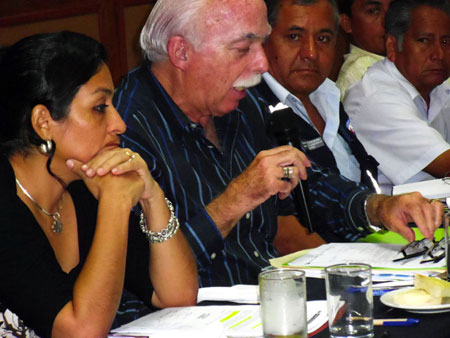The Health Policy Project ended in 2016. Work continued under Health Policy Plus (HP+) until 2022.
NEWS & VIEWS
Multisectoral Committee in Peruvian Amazon Plans Policy Reforms to Improve Reproductive Health
Posted August 27, 2012
 |
The Sexual Reproductive Health Roundtable is made up of representatives from the regional Ucayali government, youth organizations, civil society, professional organizations, the Peruvian Armed Forces, the national Social Security Institute, and regional health offices. The group recently reformed and has renewed its focus to advocate for policies that promote better sexual and reproductive health for the people of Ucayali. Photo by Health Policy Project |
Nestled in the Amazon rainforest, Ucayali is one of Peru’s poorest regions. Many remote communities do not have easy access to high-quality medical and reproductive health services. This presents a significant challenge to ensuring the health of Ucayali’s residents, particularly its youth.
Throughout the region, teenage pregnancy and maternal mortality rates are higher than the national average. In Peru, consensual sex between adolescents ages 14 to 18 is considered an illegal activity that carries a minimum 25-year jail sentence. Many health workers do not offer teenage girls information on contraceptive options for fear of being accused of promoting sexual activity among teens. Yet, in an area where one quarter of women between the ages 15 to 19 have already begun to bear children, it is essential to break down barriers that prevent access to contraceptives. Use of contraceptives not only prevents unintended pregnancy—it can also protect the lives of many women who face increased health risks when giving birth at a young age.
Around the world, many developing countries have formed contraceptive security committees to help ensure adequate funding and well-functioning supply chains to provide family planning commodities. Such committees also strengthen national and local engagement in the development and implementation of reproductive health policies and programs, especially as donor countries scale down the scope of their support.
In recent years, health systems in developing countries have become increasingly decentralized, with local and regional officials assuming increased budgetary and planning responsibilities. To support this transition, the Health Policy Project’s (HPP) Latin America and the Caribbean Regional Contraceptive Security Initiative has provided technical assistance for the past two years to establish contraceptive security committees at lower levels of national health systems, where the greatest remaining barriers in accessing reproductive health services commonly occur.
Since 2011, HPP has worked to enhance access to contraceptives and family planning services in the Ucayali region of Peru. With the help of HPP, an inactive group established to monitor policies related to sexual and reproductive health in Ucayali – the Sexual and Reproductive Health (SRH) Roundtable – has started to function once more. The roundtable is made up of representatives from the regional Ucayali government, youth organizations, civil society, professional organizations, the Peruvian Armed Forces, the national Social Security Institute, and regional health offices. The reinvigorated SRH Roundtable has now renewed its focus to advocate for policies that promote better sexual and reproductive health for the people of Ucayali.
In June 2012, more than 30 representatives from governmental, non-governmental, national, and international organizations came together at the Roundtable to sign the “Commitment to Improve Sexual and Reproductive Health and Family Planning in the Ucayali Region.”
Signatories committed themselves to:
- Prioritize family planning in the regional policy agenda
- Secure family planning budgeting and financing
- Improve the quality of sexual and reproductive health services
- Contribute to the implementation of public policies which ensure access to high-quality sexual and reproductive health services in the region
- Implement comprehensive sexual education programs in the region’s educational institutions
The participants also agreed to support the passage of two new regional laws, as well to modify an article in the current general health law and the penal code. These changes will specifically focus on improving the reproductive health of adolescents. The proposed laws would decriminalize consensual teenage sexual activity, enabling local health professionals to counsel teens on reproductive health options and empower youth to seek contraceptives.
The event demonstrated the vision and collective strength of the SRH Roundtable and its continued momentum towards sustainability and leadership in policy reform. HPP has continued to provide support to the group’s efforts by conducting advocacy sessions with key policy stakeholders interested in monitoring accountability for following through on these commitments.
The commitment to improve family planning and reproductive health signals an important success for the SRH Roundtable, and most importantly, for people living in the Ucayali region.
Download printable PDF version
Read more about the Latin America and Caribbean Contraceptive Security Initiative
What's New
- Something to Build On: “Innovation Exchange” Celebrates the Health Policy Project’s Close and a New Beginning
- What Will it Take for Tanzania to Achieve ART Targets and Ensure Long-Term Sustainability of the HIV Response?
- Helping Kenya’s County Leaders Advocate for Increased Health Investments
- HPP Holds Working Meeting on Ensuring Responsible PEPFAR Transitions for Key Populations
- Health Policy Project Celebrates 2016 International Women's Day
- HPP Staff Participate in White House Conference on HIV Stigma Reduction

